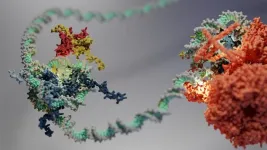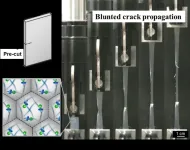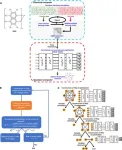(Press-News.org) WEST LAFAYETTE, Ind. – Health care providers and their patients could know with greater confidence whether pancreatic cysts are benign or potentially malignant, and if surgery is required to remove them, by using a new diagnostic test currently in development.
Amplified Sciences, a clinical-stage life sciences diagnostic company that licenses Purdue University innovations, has received a Phase I Small Business Innovation Research, or SBIR, grant of approximately $400,000 from the National Cancer Institute (NCI) to develop the test. The company focuses on accurately detecting and categorically assessing the risks of debilitating diseases.
CEO Diana Caldwell said the incidental detection rate of cystic pancreatic lesions has increased significantly due to the aging population and advances in clinical imaging technologies. However, there is a lack of definitive diagnostics to accurately assess if a cyst is benign or potentially malignant.
“Health care professionals need better tools to help them manage these patients and identify individuals most at risk for pancreatic cancer,” Caldwell said. “Pancreatic cysts are a window to early detection and represent an important risk factor in identifying pancreatic cancer early.”
Caldwell said clinicians must balance the risk of missing a potentially malignant cyst with taking unnecessary surgical action to remove a benign cyst. She said retrospective studies have found almost one-fourth of surgeries to remove pancreatic cysts are unwarranted.
“However, previous studies have also revealed that when clinicians use a wait-and-see approach to monitor the development of pancreatic cancer, up to a quarter of patients receive surgery too late,” Caldwell said. “The dual-edged nature of this process highlights the need for better early-stage diagnostic tools.”
Caldwell said the NCI grant will help fund important technical and clinical validation milestones, including the procurement of banked patient samples and clinical trials.
The company’s pancreatic cancer diagnostic products are based on technology invented by V. Jo Davisson, professor of medicinal chemistry and molecular pharmacology in Purdue University’s College of Pharmacy and a faculty member of the Purdue Institute for Drug Discovery. Davisson serves as the chief scientific officer of Amplified Sciences.
“This award recognizes the strength of our scientific team, the potential of our chemistry platform and the National Institutes of Health’s interest in supporting early-stage diagnostics in this disease state,” Davisson said.
The state of Indiana is also supportive of startups earning SBIR grants. Through a program managed by Elevate Ventures, the company is eligible for a Phase I grant match of up to $50,000.
Amplified Sciences licenses Davisson’s intellectual property through the Purdue Research Foundation Office of Technology Commercialization.
About Amplified Sciences
Amplified Sciences is a clinical-stage life science diagnostics startup focused on detecting and preempting the risks of debilitating diseases, thus providing health providers the ability to treat patients earlier with better outcomes. The company’s ultrasensitive chemistry platform leverages technology licensed from Purdue University, and its headquarters is in West Lafayette, Indiana. Their lead assay has published clinical evidence in pancreatic cancer. To learn more about Amplified Sciences, visit amplifiedsciences.com.
About Purdue University
Purdue University is a public research institution with excellence at scale. Ranked among top 10 public universities (Times Higher Education/Wall Street Journal and QS), with two colleges in the top 4 in the United States (U.S. News & World Report), Purdue discovers and disseminates knowledge with a quality and at a scale second to none. More than 105,000 students study at Purdue across modalities and locations, with 50,000 in person on the West Lafayette campus. Committed to affordability and accessibility, Purdue’s main campus has frozen tuition 12 years in a row. See how Purdue never stops in the persistent pursuit of the next giant leap, including its first comprehensive urban campus in Indianapolis, the new Mitchell E. Daniels, Jr. School of Business, and Purdue Innovates, at https://stories.purdue.edu.
About Purdue Research Foundation Office of Technology Commercialization
The Purdue Research Foundation Office of Technology Commercialization operates one of the most comprehensive technology transfer programs among leading research universities in the U.S. Services provided by this office support the economic development initiatives of Purdue University and benefit the university’s academic activities through commercializing, licensing and protecting Purdue intellectual property. In fiscal year 2022, the office reported 157 deals finalized with 237 technologies signed, 379 disclosures received and 169 issued U.S. patents. The office is managed by the Purdue Research Foundation, which received the 2019 Innovation and Economic Prosperity Universities Award for Place from the Association of Public and Land-grant Universities. In 2020, IPWatchdog Institute ranked Purdue third nationally in startup creation and in the top 20 for patents. The Purdue Research Foundation is a private, nonprofit foundation created to advance the mission of Purdue University. Contact otcip@prf.org for more information.
Writer/Media contact: Steve Martin, sgmartin@prf.org
Sources: Diana Caldwell, diana.caldwell@amplifiedsci.com
Jo Davisson, vjdavisson@amplifiedsci.com
END
Amplified Sciences receives $400,000 NCI grant to improve early detection of pancreatic cancer
The company will develop and validate testing for an assay to improve detection of pancreatic cancer in patients diagnosed with pancreatic cystic lesions
2023-07-12
ELSE PRESS RELEASES FROM THIS DATE:
Birmingham start-up awarded funding for technology that generates water out of air
2023-07-12
NovNat Tech Ltd, a visionary new company based in the Unit 9 incubator at the Birmingham Research Park, has secured funding from Innovate UK to develop a novel technology that can generate water out of air.
NovNat Tech is offering solutions to one of the most critical problems of today and the future, the global water scarcity crisis, and is developing a first of its kind ‘atmospheric water harvester’ to help address the global water shortage.
The harvest uses a proprietary material that has already been ...
Webb celebrates first year of science with close-up on birth of sun-like stars
2023-07-12
From our cosmic backyard in the solar system to distant galaxies near the dawn of time, NASA’s James Webb Space Telescope has delivered on its promise of revealing the universe like never before in its first year of science operations. To celebrate the completion of a successful first year, NASA has released Webb’s image of a small star-forming region in the Rho Ophiuchi cloud complex.
“In just one year, the James Webb Space Telescope has transformed humanity’s view of the cosmos, peering ...
Lupus Research Alliance announces recipients of 2023 Diversity in Lupus Research Awards
2023-07-12
NEW YORK, NY, July 12. The Lupus Research Alliance is pleased to announce the 2023 recipients of the Career Development and Postdoctoral Awards to Promote Diversity in Lupus Research. The Diversity in Lupus Research Awards aim to foster the development of outstanding, underrepresented minority scientists and establish a diverse community of researchers and clinicians in the field of lupus.
Lupus is a debilitating autoimmune disorder, and the prevalence, severity of symptoms, and mortality are higher among people of color. Yet a recent report by the National Science Foundation showed that while “Blacks or African Americans, Hispanics or Latinos, ...
A glimpse into the hexasome: 40 years on
2023-07-12
In 1983, scientists discovered hexasomes – a unique molecular structure that helps cells package their DNA. Now, a study conducted by the Eustermann group at EMBL Heidelberg has shed light on how DNA packaging into hexasomes can affect the function of enzymes involved in gene regulation.
DNA: a lot to unpack
DNA is a very long, thin thread containing our genetic instructions. Being much longer than the tiny space inside our cells, it needs a clever packaging system. That’s where nucleosomes come into play – tiny spool-like structures that help compact our genetic information. Multiple nucleosomes are then linked ...
Award for dementia researcher from New York City
2023-07-12
This year’s “Hartwig Piepenbrock-DZNE Prize”, endowed with 60,000 euros, goes to the British neuroscientist Alison Goate, DPhil. The award recognizes her outstanding contributions to research into Alzheimer’s disease and frontotemporal dementia. Professor Goate researches and teaches at the Icahn School of Medicine at Mount Sinai, an international leader in biomedical education, research, and patient care located in New York City. The prize is presented jointly by the Piepenbrock Group and the German Center for Neurodegenerative Diseases (DZNE). The award ...
Towards crack-resistant nanoparticle-based latex films
2023-07-12
Synthetic polymer materials, such as plastics and rubbers, have become ubiquitous in our daily lives. It is, therefore, essential to ensure that they are safe, durable, and sustainable. This is especially true for synthetic latex films, which are widely used in packaging, biomedicine, and electronics.
But what exactly are synthetic latex films? Simply put, they are a type of nanoparticle-based films that are produced by drying out a mixture of polymer nanoparticles and water. As the solvent evaporates, the nanoparticles become more packed until finally the interactions between polymer chains at the boundaries of nanoparticles create a coherent film. Unfortunately, the latex films ...
Better and faster design of organic light-emitting materials with machine learning and quantum computing
2023-07-12
Over the past decade, organic luminescent materials have been recognized by academia and industry alike as promising components for light, flexible and versatile optoelectronic devices such as OLED displays. However, it is a challenge to find suitably efficient materials.
To address this challenge, a joint research team has developed a novel approach combining a machine learning model with quantum-classical computational molecular design to accelerate the discovery of efficient OLED emitters. This research was published May 17 in Intelligent Computing, a Science Partner Journal.
The ...
Understanding the intersection of Alzheimer’s Disease caregiving and the LGBT experience
2023-07-12
INDIANAPOLIS – A new study of caregivers of LGBT older adults living with Alzheimer’s disease provides rare insight into the intersection of caregiving and the LGBT experience.
Researchers from Regenstrief Institute and the medical schools of Indiana University and University of Colorado report that many common caregiver experiences -- such as feelings of social isolation and of being overwhelmed -- are similar for caregivers, whether an individual with Alzheimer’s disease is LGBT or not. However, because LGBT older adults often do not have adult children who can serve as caregivers or may be estranged ...
A step toward treating chemotherapy-resistant prostate cancer
2023-07-12
Prostate cancer is a leading cause of death among American men, and it’s resistant to one of the most powerful chemotherapy medications — cisplatin. Now, researchers reporting in ACS Central Science have developed the first therapy of its kind that disrupts prostate cancer cells’ metabolism and releases cisplatin into the weakened cells, causing them to die. In mouse models, an orally administered version shrunk tumors substantially.
Cisplatin attacks testicular, breast, bladder, lung and ovarian cancer cells, damages their DNA and effectively destroys tumors. However, it’s not effective against prostate cancer ...
A new tactic to take on leprosy
2023-07-12
Leprosy has existed since at least Biblical times, yet scientists still don’t know exactly how Mycobacterium leprae causes the disease’s symptoms. Though antibiotics can treat the illness, researchers are concerned about the increase in drug-resistant strains. Now, a team reporting in ACS Central Science has begun to understand the unique role certain immune receptors play in leprosy infections in mice, which could lead to new types of treatments for this disease and others in humans.
Thousands of people are currently affected by leprosy — also known as Hansen’s disease — according to the World Health Organization. The disease can cause skin ...
LAST 30 PRESS RELEASES:
Study reveals insights about brain regions linked to OCD, informing potential treatments
Does ocean saltiness influence El Niño?
2026 Young Investigators: ONR celebrates new talent tackling warfighter challenges
Genetics help explain who gets the ‘telltale tingle’ from music, art and literature
Many Americans misunderstand medical aid in dying laws
Researchers publish landmark infectious disease study in ‘Science’
New NSF award supports innovative role-playing game approach to strengthening research security in academia
Kumar named to ACMA Emerging Leaders Program for 2026
AI language models could transform aquatic environmental risk assessment
New isotope tools reveal hidden pathways reshaping the global nitrogen cycle
Study reveals how antibiotic structure controls removal from water using biochar
Why chronic pain lasts longer in women: Immune cells offer clues
Toxic exposure creates epigenetic disease risk over 20 generations
More time spent on social media linked to steroid use intentions among boys and men
New study suggests a “kick it while it’s down” approach to cancer treatment could improve cure rates
Milken Institute, Ann Theodore Foundation launch new grant to support clinical trial for potential sarcoidosis treatment
New strategies boost effectiveness of CAR-NK therapy against cancer
Study: Adolescent cannabis use linked to doubling risk of psychotic and bipolar disorders
Invisible harms: drug-related deaths spike after hurricanes and tropical storms
Adolescent cannabis use and risk of psychotic, bipolar, depressive, and anxiety disorders
Anxiety, depression, and care barriers in adults with intellectual and developmental disabilities
Study: Anxiety, gloom often accompany intellectual deficits
Massage Therapy Foundation awards $300,000 research grant to the University of Denver
Gastrointestinal toxicity linked to targeted cancer therapies in the United States
Countdown to the Bial Award in Biomedicine 2025
Blood marker from dementia research could help track aging across the animal world
Birds change altitude to survive epic journeys across deserts and seas
Here's why you need a backup for the map on your phone
ACS Central Science | Researchers from Insilico Medicine and Lilly publish foundational vision for fully autonomous “Prompt-to-Drug” pharmaceutical R&D
Increasing the number of coronary interventions in patients with acute myocardial infarction does not appear to reduce death rates
[Press-News.org] Amplified Sciences receives $400,000 NCI grant to improve early detection of pancreatic cancerThe company will develop and validate testing for an assay to improve detection of pancreatic cancer in patients diagnosed with pancreatic cystic lesions





